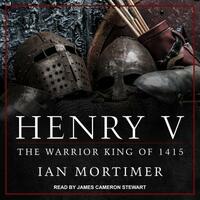Take a photo of a barcode or cover
informative
reflective
slow-paced
Finally, a biography of Henry V that doesn’t pander to propaganda, ignores facts, and hero worships him as is done in Shakespeare’s play.
Quite refreshing and informative. Actually lays bare the actions of the man, often so covered in roses and seen through rose colored glasses of adulation.
The only bad part in my opinion is the narrator, sounds like he should be on 1940s radio. He obviously has no interest in what he’s reading, and his tone is very tilting and rather annoying. I much prefer Dr. Mortimer‘s books that are narrated by him.
Quite refreshing and informative. Actually lays bare the actions of the man, often so covered in roses and seen through rose colored glasses of adulation.
The only bad part in my opinion is the narrator, sounds like he should be on 1940s radio. He obviously has no interest in what he’s reading, and his tone is very tilting and rather annoying. I much prefer Dr. Mortimer‘s books that are narrated by him.
I picked up this book because I have always been intrigued by Henry V and his infamous battle at Agincourt. This book was not what I expected but was still quite enjoyable. Mortimer goes day by day through Henry's life, showing each detail that led up to the famous battle and the aftermath thereof. This at times can seem a little tedious and sometimes heavy, but it shows overall just how much truth is behind the myth of Henry V being one of the best English kings. Mortimer does a great job at describing what is happening during the novel. At times, it's almost like you are there with Henry. It is very well researched as well. Would recommend to anyone who is looking to delve a little more into Henry V's history.
challenging
informative
slow-paced
The book challenges the idea that Henry V, while one of England's most famous kings for good reason, wasn't as flawed as he was. Mortimer takes a very different approach and uses day-to-day data leading up to, during, and after the Battle of Agincourt. He pinpoints the decisions that were made, addresses theories, explanations, and defences, and logically argues the most illogical away. He makes Henry V human, acknowledging good and rational decisions and mentalities and pointing out bad decisions that were made (the slaughter of prisoners of war at Agincourt). The book, while methodical and illustrative, does make for a slow read/listen, which is why I am not giving this a full five star review. Make no mistake, however, this is a wonderful guide to Henry V's most famous victory.
I got most of the way, but I couldn't focus on something as dense as this in 2022.
Okay, okay. Like everyone else, I too fell for the myth of Henry V that Shakespeare created. It's hard not to, when we all want such grand figures to look up to, it is easy to blur the line between man and myth.
But this book debunks all those myths with a level of detail that is sometimes headache-inducing. Truly the level of detail is mind boggling, and the author deserves immense kudos for managing to piece all of this into a coherent story. But this I'd also an absolutely massive book, so be prepared for a long read with more fact and simple reading than prose. You'll learn a lot, though.
But this book debunks all those myths with a level of detail that is sometimes headache-inducing. Truly the level of detail is mind boggling, and the author deserves immense kudos for managing to piece all of this into a coherent story. But this I'd also an absolutely massive book, so be prepared for a long read with more fact and simple reading than prose. You'll learn a lot, though.
When I studied history at university many, many moons ago, history and narrative were two completely separate entities. In fact history and narrative were not allowed in the same room together, not even a little bit of small talk. Us faux academics used to scorn those who pushed the dignified objective history with the exaggerated and flowery narrative, how very dare they. Pop history, we called it.
Since then I have toned down the snob a little, and come to see that yes history does have a natural narrative arch, and reading a history with a prominent narrative not only high lights the drama, intrigue and suspense but also highlight historical argument.
And after this long winded introduction I get to 'Henry V's Year of Glory'. Mortimer uses a specific narrative format, chronicling almost day by day of the year 1415, the year of Agincourt. This is a year of religious reform, political strife, and the usual royal murder and intrigue. By scaling back the time line, Mortimer is able to create one 551 page case study of the main issues in the early 15th century. '1415' is also a brilliant study of character, Henry V's character. How Henry reacted to his situation, both political and spiritual of the time is a reflection of religious zealousness and political ambition, with a dash of Daddy issues thrown in for good measure.
I was not overly familiar with Henry V when I picked up this biography. In fact all I knew was that Kenneth Branagh had played Henry in a Shakespeare adaption. Mortimer has a gift for historical narrative, taking you into candle lit halls, blood coated mud on the field of Agincourt, his writing is vivid and too the point. Mortimer's argument is also strong and well executed. This is a book many might not agree with, but it will be a interesting and absorbing debate.
Since then I have toned down the snob a little, and come to see that yes history does have a natural narrative arch, and reading a history with a prominent narrative not only high lights the drama, intrigue and suspense but also highlight historical argument.
And after this long winded introduction I get to 'Henry V's Year of Glory'. Mortimer uses a specific narrative format, chronicling almost day by day of the year 1415, the year of Agincourt. This is a year of religious reform, political strife, and the usual royal murder and intrigue. By scaling back the time line, Mortimer is able to create one 551 page case study of the main issues in the early 15th century. '1415' is also a brilliant study of character, Henry V's character. How Henry reacted to his situation, both political and spiritual of the time is a reflection of religious zealousness and political ambition, with a dash of Daddy issues thrown in for good measure.
I was not overly familiar with Henry V when I picked up this biography. In fact all I knew was that Kenneth Branagh had played Henry in a Shakespeare adaption. Mortimer has a gift for historical narrative, taking you into candle lit halls, blood coated mud on the field of Agincourt, his writing is vivid and too the point. Mortimer's argument is also strong and well executed. This is a book many might not agree with, but it will be a interesting and absorbing debate.
A solid retelling of a pivotal year in British history, and the most famous year of King Henry V’s rein. Unfortunately, the biography gets mired in its own format, a day-by-day retelling of the year 1415. The problem with a journalistic format is that an enormous amount of time is devoted to simply recounting payments granted or received. At certain places, this goes on long enough for the reader for forget that they are reading a biography and not an accounting ledger. And, after the climactic battle of Agincourt, the narrative seems to die out entirely, with very little to report for the months of November an December.
As a way of reconciling facts and timelines and showing how various religious and political actions of the day came together in a kind of perfect storm for victory, the book excels. But as a narrative, it falls short.
After thoroughly enjoying Mortimer’s biography of Henry IV, I would like to see him author another work on Henry V in a more conventional¬¬ biographical format. Given the glimpses of the man and his life we are shown in the more dynamic journal-style entries, I think it would make for fascinating reading.
As a way of reconciling facts and timelines and showing how various religious and political actions of the day came together in a kind of perfect storm for victory, the book excels. But as a narrative, it falls short.
After thoroughly enjoying Mortimer’s biography of Henry IV, I would like to see him author another work on Henry V in a more conventional¬¬ biographical format. Given the glimpses of the man and his life we are shown in the more dynamic journal-style entries, I think it would make for fascinating reading.
adventurous
challenging
dark
informative
inspiring
medium-paced
Okay, okay. Like everyone else, I too fell for the myth of Henry V that Shakespeare created. It's hard not to, when we all want such grand figures to look up to, it is easy to blur the line between man and myth.
But this book debunks all those myths with a level of detail that is sometimes headache-inducing. Truly the level of detail is mind boggling, and the author deserves immense kudos for managing to piece all of this into a coherent story. But this I'd also an absolutely massive book, so be prepared for a long read with more fact and simple reading than prose. You'll learn a lot, though.
But this book debunks all those myths with a level of detail that is sometimes headache-inducing. Truly the level of detail is mind boggling, and the author deserves immense kudos for managing to piece all of this into a coherent story. But this I'd also an absolutely massive book, so be prepared for a long read with more fact and simple reading than prose. You'll learn a lot, though.





